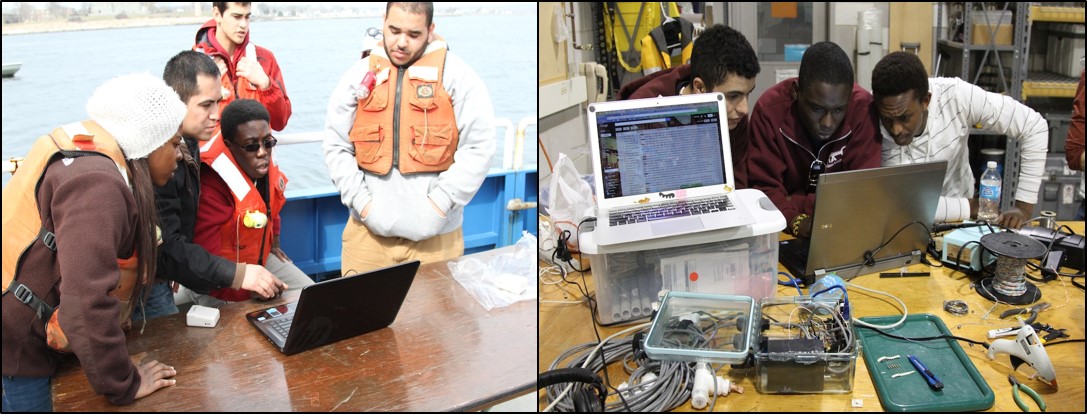|
2014 Ocean Science & Technology Challenge - 05.01.2014
INTRODUCTION
The Center for Ocean Sciences Education Excellence – Technology and Engineering for Knowledge (COSEE-TEK) and the Louis Stokes Alliance for Minority Participation (LSAMP) Northeast Alliance have been collaborating for the past three years to engage underrepresented minority undergraduate students (URMS) in STEM. Specifically, the goals of this partnership are: 1) to expose URMS to ocean sciences and technology as potential career paths and 2) to use ocean science and technologies as a vehicle to develop the students’ 21st Century skills.
21ST CENTURY SKILLS
The National Research Council (NRC) examined the nature of deeper learning and 21st century skills to define the range of attributes comprising these skills, describe how they relate to each other, summarize research demonstrating the importance of these skills to academic and workforce success and identify what works to build these skills (NRC, 2012). The report describes three “domains of competence” – the cognitive, intrapersonal and interpersonal and identifies clusters of closely related competencies (1).
The 2014 COSEE-TEK / LSAMP Ocean Science & Technology Challenge (OSTC) involved students and mentors working together to design, build, and field test an autonomous sensor or sampling device that could address a sampling need of Long Island Sound.
 LSAMP teams work closely with COSEE-TEK mentors to design, build and test their remote ocean sensing devices. |
Observations by LSAMP Evaluator
- Many students noted that working hands-on was a great experience – and some noted the experience was very different than what they expected. Another student noted that she “learned with her whole body” and felt like because of that she learned more and would retain knowledge longer.
- “It’s the ultimate lab.” This comment came from a student in response to other positive student comments about having resources and expertise available to them as they tried to solve a “real world” problem in a short amount of time.
- Other students mentioned firsts that were relational or interdisciplinary such as being a team leader, working collaboratively with different STEM majors to accomplish one goal, collaborating with the COSEE-TEK mentors and instructors, and working side by side with students from other schools. One student commented that the being a team leader was “a crucial experience for my career.”
IMPACTS
The Pre/Post Evaluation of the 2013 OSTC provided several interesting insights into how well the first OSTC met its goals. Overall the Challenge provided an opportunity that exposed students to the domains of 21st century skills and the survey indicated increases in how strongly students agreed with the questions. Notably, students recognized the value of inquiry, working as a team and hands-on experiences. The 2014 OSTC involved all five universities in the NE Alliance (UConn, UMass, URI, WPI, Northeastern). Students attended an orientation workshop, worked closely with a technology mentor to design and build their ocean samplers and finally test them at sea from UConn’s RV Connecticut. The OSTC provides an evolving model to both build 21st skills in undergraduate students and engage them in ocean science and technology.
REFERENCES
- National Research Council. (2012). Education for Life and Work: Developing Transferable Knowledge and Skills in the 21st Century.
Return to News Archive
|

